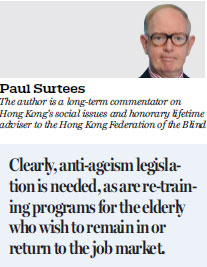Rapidly expanding elderly population needs protection
Updated: 2017-05-19 07:32
By Paul Surtees
|
|||||||
Hong Kong society is aging fast. Our young couples aren't having enough children to maintain the present working population. Also, thankfully, better healthcare and other factors let our citizens live much longer lives. The few babies born here today have one of the world's longest expected life spans. All this means there is a rapidly growing proportion of the population of senior citizens, and this trend is likely to continue. The question which must be asked is what additional legal protections and further governmental support this "silver" sector of our citizenry will need.
Hong Kong is one of the world's wealthiest cities; holding gigantic sums in financial reserves - more than most sovereign states enjoy. Our economic success has been built on the backs of the hard work of generations of Hong Kong people (many of them originally struggling new arrivals from the north). Now that many of them have reached their twilight years, does not our society owe them a debt of gratitude? That posited debt can be repaid by our society better looking after our growing number of elderly people. This article suggests how.
Sadly, a high proportion of the very poor in this city are also well past retirement age. In this busy city, where the cost of living is among the highest in the world, we daily witness the ghastly spectacle of the elderly poor struggling to earn a crust by collecting cartloads of discarded drinks cans or cardboard boxes for recycling. And large numbers of similarly poor old-timers live in inhuman subdivided flats, known as cage homes. What an unenviable way to spend the last years of your life.

With the exception of a lucky few, such as our civil servants, most Hong Kong people will not receive a decent pension upon retirement. The Mandatory Provident Fund scheme, as currently formulated, will simply pay a lump sum upon retirement. And that lump sum will be insufficient to fund a comfortable retirement. Most of today's post-retirement citizens don't even have that since the MPF started up only comparatively recently. Clearly a universal scheme to pay out a monthly pension, at a livable rate, is needed. Those already in the elderly category could be deemed - by their lifetime's hard work - to have contributed to it in that way for they are the neediest. But all Hong Kong citizens should have the protection against abject poverty in old age that a monthly pension represents. Let's hope the new administration of Carrie Lam Cheng Yuet-ngor would take the bold step of dipping deeply into our vast public financial reserves to fund this costly but essential provision.
The Chinese University of Hong Kong's Centre for Rights and Justice has already conducted two years of ongoing research into the needs of the elderly, in terms of legal protection. Their Professor Zou Mimi has recently called for Hong Kong's laws to be updated because at present we fall behind many other developed economies in this regard. For example, in Singapore employers are obliged, in certain circumstances, to offer as much as five years more employment to those reaching retirement age. Being pushed out of paid work into an under-funded retirement is an unappealing prospect. When we look at the make-up of Hong Kong's Executive Council, and farther afield at the heads of state around the world, it's immediately apparent that most of them are past current standard retirement age. But they obviously continued to function at the highest level of crisis management, policy decision-making and leadership. So by what logic should clerks, shop assistants and the rank and file of many industries not be allowed to carry on what undoubtedly are far less intellectually challenging tasks beyond the currently relatively youthful retirement age of 60 in most cases?
Job applicants have faced prejudices on the grounds of ethnicity, gender, sexual orientation and race but the ageism that confronts senior job seekers can be even more debilitating and demoralizing because would-be employers tend to assume a person's work capacity and efficiency would decrease exponentially with age. That is true in many cases but there are quite a few exceptions among the silver community. The result is that the type of work secured by the elderly job seekers is usually near the bottom of the job market - usually the jobs are either temporary or low-paid in nature.
Clearly, anti-ageism legislation is needed, as are re-training programs for the elderly who wish to remain in or return to the job market.
Many elderly folks worry about not being able to die in dignity and relative comfort. They are rightly concerned that should they fell seriously ill, rather than continue to suffer long-term pain, they would like to have the legal right to end all treatment and be allowed to die peacefully by declining all intrusive and traumatic medical intervention which might at best keep them in a vegetative state.
That right needs to be properly spelled out and can override possible family objections. Because a dignified and pain-free end is one we all hope for and are entitled to.
(HK Edition 05/19/2017 page11)